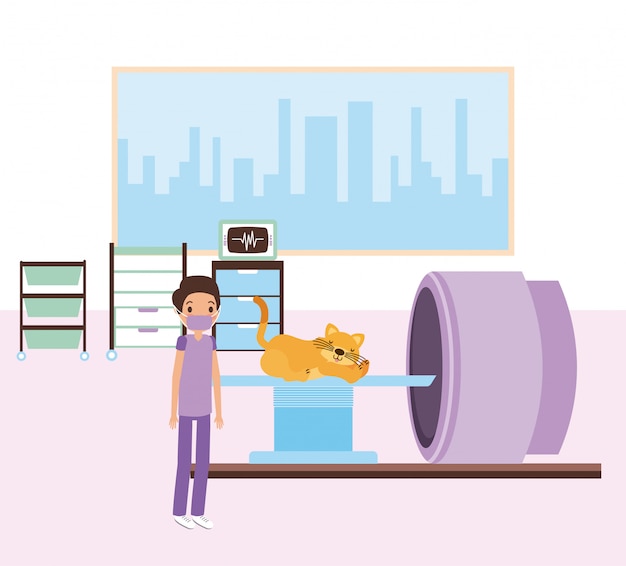Understanding Echocardiogram Results: What Pet Owners Should Know

Understanding Echocardiogram Results: What Pet Owners Should Know
If your veterinarian has recommended an echocardiogram for your pet, you may be feeling anxious and eager for clear answers. Understanding what echocardiogram results mean and how they guide your pet’s heart care is essential for making confident decisions about their health. At 4 Paws Imaging, our team of veterinary imaging professionals in 2581 Ogden Avenue, Downers Grove, IL 60515 is committed to providing advanced diagnostic imaging, including echocardiograms, for pets in Downers Grove and surrounding communities. Whether you are searching for a "cardiology vet near me" or need in-depth pet heart ultrasound interpretation, our expertise ensures your pet receives the highest level of specialized care.
This blog will walk you through why an echocardiogram may be needed, what to expect during the procedure, how to interpret the results, and what steps to take next. If your pet is scheduled for an echocardiogram or if you’re curious about what the findings can reveal, you are in the right place. We will also share how 4 Paws Imaging partners with your primary care veterinarian to deliver comprehensive cardiac imaging services in Downers Grove. For more details about the process or to prepare for your visit, you can review our Echocardiogram Patient History Form before your appointment.
Recognizing When Your Pet Might Need an Echocardiogram
Understanding the signs that signal a need for advanced cardiac evaluation can help you advocate for your pet’s health. Common symptoms that might prompt your veterinarian to refer you for an echocardiogram include persistent coughing, difficulty breathing, unexplained lethargy, or fainting episodes. Additional warning signs are decreased exercise tolerance, swelling in the abdomen, or blue-tinged gums. Some pets, especially certain breeds or those with existing heart murmurs, may be at higher risk for heart disease and require closer monitoring.
If your pet has experienced any of these symptoms, your primary veterinarian may recommend specialized imaging such as an echocardiogram to get a detailed view of heart function and structure. In Downers Grove, pet heart ultrasound interpretation is a crucial step in diagnosing and managing heart conditions. When searching for a "specialist vet near me," choosing a facility with advanced expertise and a board-certified cardiologist is essential for accurate diagnosis and peace of mind.
What Is an Echocardiogram and Why Is It Performed?
An echocardiogram is a sophisticated ultrasound examination of the heart. Unlike a standard X-ray, which provides a static image, an echocardiogram shows real-time images of the heart’s chambers, valves, and major vessels in motion. This non-invasive procedure is considered the gold standard for evaluating cardiac health in both dogs and cats.
There are several reasons why your veterinarian or a "cardiology veterinarian near me" might refer your pet for an echocardiogram. The most common indications include investigation of a heart murmur, assessment of suspected congenital heart disease, monitoring of chronic cardiac conditions, or evaluation prior to anesthesia for pets with known heart issues. In some cases, an echocardiogram is recommended to monitor heart function in breeds predisposed to specific cardiac diseases. For comprehensive heart imaging, echocardiogram ultrasounds at 4 Paws Imaging are reviewed by a board-certified cardiologist, ensuring each report is detailed and actionable for your referring veterinarian.
Understanding Echocardiogram Results for Pets
After your pet’s echocardiogram, the veterinary imaging team will analyze several key parameters. The results provide a wealth of information, but understanding what the findings mean can be overwhelming for pet owners. The main areas of focus in pet heart ultrasound interpretation include measurements of heart chamber size, assessment of valve function, evaluation of blood flow, and identification of abnormal structures or masses.
For example, enlarged heart chambers can indicate chronic heart disease or valve insufficiency. Abnormal valve movement may suggest congenital defects, degenerative disease, or infection. Changes in blood flow patterns, detected using Doppler ultrasound, can reveal issues such as stenosis or regurgitation. The echocardiogram may also uncover fluid accumulation around the heart, tumors, or other structural abnormalities that are not visible on standard radiographs.
When interpreting echocardiogram results for pets, our veterinary professionals collaborate closely with your referring veterinarian to provide a clear summary of findings and practical recommendations. The report will typically include terminology like "left atrial enlargement," "mitral valve insufficiency," or "pulmonary hypertension." Each of these terms relates to specific functions or issues within your pet’s heart. If you are unsure about any aspect of your pet’s results, our team is available to help clarify what the findings mean and how they impact your pet’s ongoing care.
What Happens After an Echocardiogram? Treatment and Management Pathways
The next steps after receiving your pet’s echocardiogram results depend on the underlying diagnosis. Mild changes may only require regular monitoring and follow-up imaging. More significant findings, such as advanced valve disease or evidence of heart failure, often lead to collaborative management between your primary veterinarian and a board-certified cardiologist.
Treatment options for cardiac conditions identified through echocardiogram imaging can involve medications to control blood pressure, reduce fluid buildup, or manage abnormal heart rhythms. Recommendations may also include lifestyle modifications, such as limiting strenuous activity or adjusting your pet’s diet. In rare cases, advanced interventions or surgical procedures may be considered, but most heart conditions in pets are managed medically with close supervision.
At 4 Paws Imaging, we offer a range of adjunctive cardiac diagnostics, including electrocardiogram (ECG) testing and Holter monitor evaluations, which provide additional insights into your pet’s heart rhythm and function. These tools complement echocardiogram results for pets and guide your veterinary team in developing a personalized treatment plan.
At-Home Care and Ongoing Heart Health Monitoring
While advanced diagnostics are essential, pet owners play a vital role in supporting their pet’s heart health at home. Regular observation is key. Be attentive to changes in your pet’s breathing, energy level, appetite, or behavior. Symptoms such as increased coughing, labored breathing, fainting, or sudden weakness are especially important to report promptly to your veterinarian.
For pets with known heart conditions, follow the medication and monitoring instructions provided by your veterinary care team. Keeping a daily log of symptoms, appetite, and activity can help your veterinarian detect subtle changes over time. Routine follow-up imaging, such as repeat echocardiograms or ECGs, may be recommended to track your pet’s progress and adjust treatment as needed.
Educating yourself about your pet’s specific heart condition can empower you to make informed decisions and recognize early warning signs. If you have questions about pet diagnostics in Downers Grove, our imaging professionals are always available to provide guidance and support.
When to Seek Advanced Veterinary Cardiac Care
Knowing when to seek specialized care can make a significant difference in your pet’s outcome. Immediate evaluation is warranted if your pet experiences sudden collapse, severe difficulty breathing, persistent coughing that disrupts sleep, or swelling of the limbs or abdomen. These symptoms may indicate a progression of heart disease or the onset of heart failure, both of which require urgent attention.
If your pet is already under the care of a primary veterinarian and a cardiac issue is suspected, referral to a "specialist vet near me" ensures your pet receives comprehensive diagnostic imaging and expert medical interpretation. In Downers Grove, veterinary diagnostics at 4 Paws Imaging provide a full spectrum of advanced imaging for pets with suspected or confirmed heart conditions. For an overview of all the diagnostic options available, visit our advanced veterinary imaging services.
Please keep in mind that while online resources are helpful, only a thorough in-person evaluation by a qualified veterinary professional can determine the best course of action for your pet. Always consult with your veterinarian if you notice any concerning changes in your pet’s health.
Conclusion: Your Partner in Cardiac Imaging and Pet Heart Health
Echocardiogram results for pets are a powerful tool for understanding your pet’s heart health and guiding their ongoing care. With advanced pet heart ultrasound interpretation available in Downers Grove, 4 Paws Imaging is here to support both pet owners and referring veterinarians with timely, accurate, and compassionate service. When searching for a "cardiology vet near me," trust our veterinary imaging team to provide the expertise your pet deserves.
If your primary veterinarian has recommended a cardiac evaluation or you have concerns about your pet’s heart health, we encourage you to reach out to us. Our team of veterinary professionals is dedicated to making the imaging process as smooth and informative as possible. To learn more about our echocardiogram ultrasounds and how we can assist with your pet’s diagnostic needs, visit our page on echocardiogram ultrasounds or contact us at (630) 746-1382 to discuss next steps.
At 4 Paws Imaging, we are honored to play a role in your pet’s journey to better health. For the most trusted specialist vet near me and the highest quality veterinary diagnostics in Downers Grove, our imaging center is ready to serve you and your companion.
















